新标准高职高专公共英语系列教材行业英语系列
- 格式:ppt
- 大小:2.79 MB
- 文档页数:7
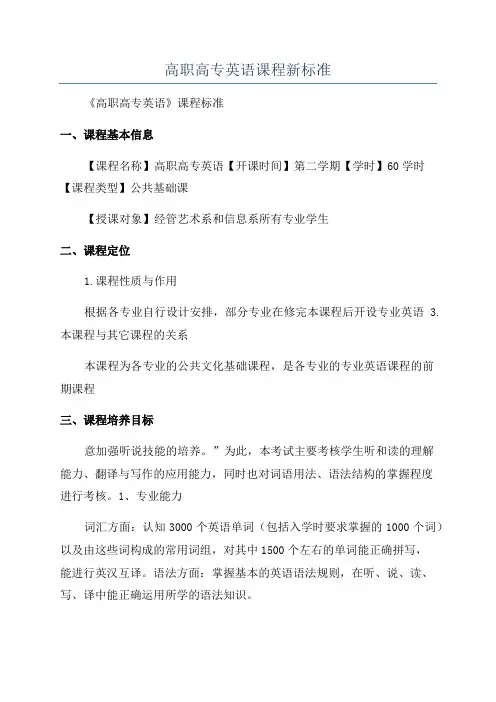
高职高专英语课程新标准《高职高专英语》课程标准一、课程基本信息【课程名称】高职高专英语【开课时间】第二学期【学时】60学时【课程类型】公共基础课【授课对象】经管艺术系和信息系所有专业学生二、课程定位1.课程性质与作用根据各专业自行设计安排,部分专业在修完本课程后开设专业英语 3.本课程与其它课程的关系本课程为各专业的公共文化基础课程,是各专业的专业英语课程的前期课程三、课程培养目标意加强听说技能的培养。
”为此,本考试主要考核学生听和读的理解能力、翻译与写作的应用能力,同时也对词语用法、语法结构的掌握程度进行考核。
1、专业能力词汇方面:认知3000个英语单词(包括入学时要求掌握的1000个词)以及由这些词构成的常用词组,对其中1500个左右的单词能正确拼写,能进行英汉互译。
语法方面:掌握基本的英语语法规则,在听、说、读、写、译中能正确运用所学的语法知识。
听力理解能力:能听懂涉及日常交际的结构简单、发音清楚、语速较慢(每分钟120词左右)的英语对话和不太复杂的陈述,理解基本正确。
能理解具体信息,理解所听材料的背景,并能推断所听材料的含义。
口语表达能力:掌握一般的课堂用语,并能模拟或套用常用口头交际句型,就日常生活和有关业务提出问题或做出简单回答,交流有困难时能采取简单的应变措施。
写作能力:能运用所学词汇和语法写出简单的短文;能用英语填写表格,套写便函、简历等,词句基本正确,无重大语法错误,格式基本恰当,表达清楚。
并且做到语法及标点使用正确,句子结构完整;句子意思清楚,符合逻辑顺序;能够正确使用连接词,文章连贯。
翻译能力:能借助词典将中等偏下难度的一般题材的文字材料译成汉语,译文基本符合汉语习惯;能正确掌握被动句式、虚拟语气句等,并且能够恰当地处理长句。
22、方法能力(1)能熟练应用现代办公自动化技术和网络技术进行工作;(2)能进行创造性思维;(3)能积极获取信息,不断积累知识,具有终身学习的理念。
(4)培养学生的合作精神;(5)使学生掌握良好的学习方法,培养学生自主学习的能力.3、社会能力(1)能较好的处理人际关系;(2)具有良好的职业道德素质、心理素质;(3)能高效的组织和执行工作任务;(4)具有良好的礼仪修养四、课程设计思路1.高职高专教育培养的是技术、生产、管理、服务等领域的高等应用性专门人才。
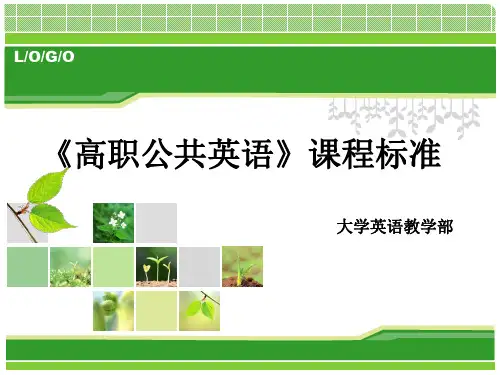
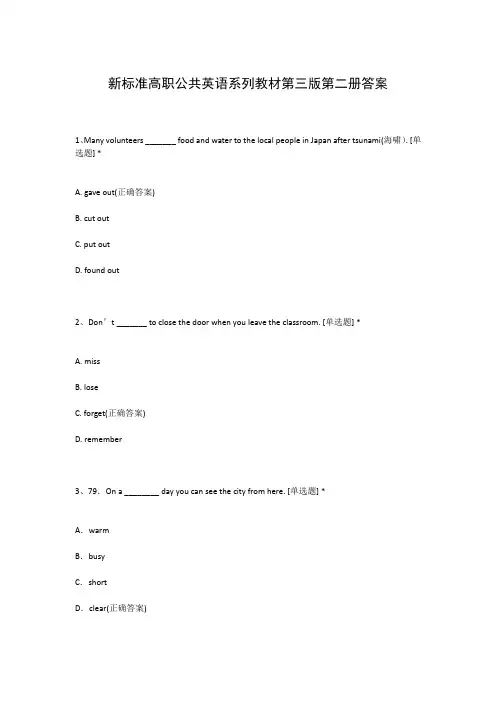
新标准高职公共英语系列教材第三版第二册答案1、Many volunteers _______ food and water to the local people in Japan after tsunami(海啸). [单选题] *A. gave out(正确答案)B. cut outC. put outD. found out2、Don’t _______ to close the door when you leave the classroom. [单选题] *A. missB. loseC. forget(正确答案)D. remember3、79.On a ________ day you can see the city from here. [单选题] *A.warmB.busyC.shortD.clear(正确答案)4、My father can?_______ a little English. [单选题] *A. speak(正确答案)B. sayC. talkD. tell5、It is reported that the fire caused serious()to that school building. [单选题] *A. damage(正确答案)B. destroyC. harmD.hurt6、( ) It tells what is going on ___the county and all____the world. [单选题] *A. across; over(正确答案)B. all; acrossC. in; inD.to; for7、How _______ it rained yesterday! We had to cancel(取消) our football match. [单选题] *A. heavily(正确答案)B. lightC. lightlyD. heavy8、--Mom, I will not eat fast food this year. Believe me.--If you make a _______, you must keep it. [单选题] *A. jokeB. noiseC. mistakeD. promise(正确答案)9、--_______ are the birds doing?--They are singing in a tree. [单选题] *A. WhoB. What(正确答案)C. HowD. Where10、In 2019 we moved to Boston,()my grandparents are living. [单选题] *A. whoB. whenC. where(正确答案)D. for which11、--_______ does Ben go to school?--By bus. [单选题] *A. How(正确答案)B. WhatC. WhereD. Why12、Grandfather lives with us. We all _______ him when he gets ill. [单选题] *A. look after(正确答案)B. look atC. look forD. look like13、Nobody noticed the thief slip into the shop, because the lights happened to _______. [单选题] *A. put outB. turn outC. give outD. go out(正确答案)14、John suggest _____ anything about it until they found out more facts. [单选题] *A not to sayB. not sayC to say notD not saying(正确答案)15、You wouldn' t have caught such ____ bad cold if you hadn' t been caught in ____?rain. [单选题] *A. a, /B. a, aC. a,the(正确答案)D. /, /16、6.Hi, boys and girls. How are you ________ your posters for the coming English Festival at school? [单选题] *A.getting onB.getting offC.getting with (正确答案)D.getting17、He prefers to use the word “strange”to describe the way()she walks. [单选题] *A. in which(正确答案)B. by whichC. in thatD. by that18、Which is _______ city, Shanghai, Beijing or Chengdu? [单选题] *A. largeB. largerC. largestD. the largest(正确答案)19、Mary _______ a small gift yesterday, but she didn’t _______ it. [单选题] *A. accepted; receiveB. received; accept(正确答案)C. receives; acceptedD. accepts; received20、The more he tried to please her, _____she seemed to appreciate it. [单选题] *A.lessB.lesserC.the less(正确答案)D.the lesser21、36.The students will go to the Summer Palace if it __________ tomorrow. [单选题] *A.won’t rainB.isn’t rainingC.doesn’t rain (正确答案)D.isn’t rain22、The students in that university are not fewer than()in our university. [单选题] *A. the oneB. thatC. themD. those(正确答案)23、This is _________ my father has taught me—to always face difficulties and hope for the best. [单选题] *A. howB. whichC. that(正确答案)D. what24、_____ is not known yet. [单选题] *A. Although he is serious about itB. No matter how we will do the taskC. Whether we will go outing or not(正确答案)D. Unless they come to see us25、John had planned to leave but he decided to stay in the hotel for _____ two days because of the heavy rain. [单选题] *A. otherB. another(正确答案)C. the otherD. others26、My watch usually _______ good time, but today it is five minutes fast. [单选题] *A. goesB. makesC. keeps(正确答案)D. gains27、If you pass your exams, we’ll have a party to celebrate. [单选题] *A. 宣布B. 发表C. 解放D. 庆祝(正确答案)28、The little boy saved his money ______ he could buy his mother a gift on Mother’s Day.()[单选题] *A. butB. such thatC. in order toD. so that(正确答案)29、There _______ some milk in the glass. [单选题] *A. is(正确答案)B. areC. haveD. has30、( ) The salesgirls in Xiushui Market have set a good example______us in learning English. [单选题] *A. to(正确答案)B. forC. withD. on。
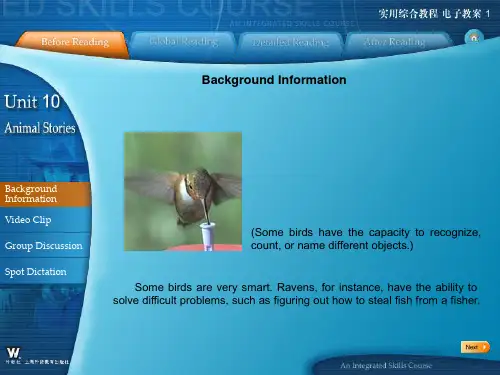

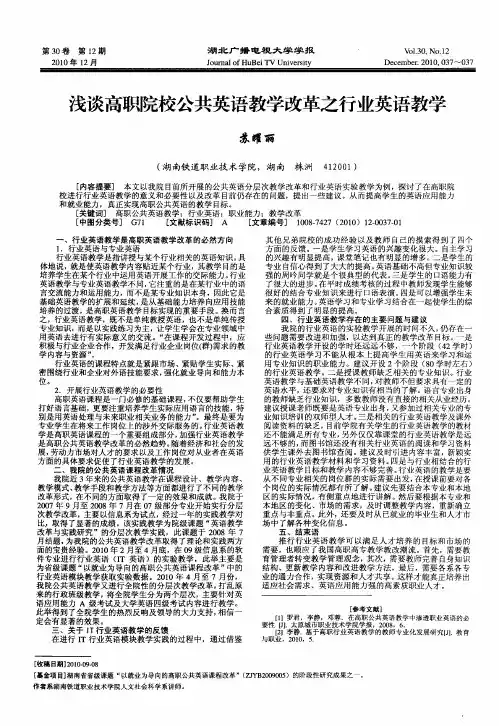
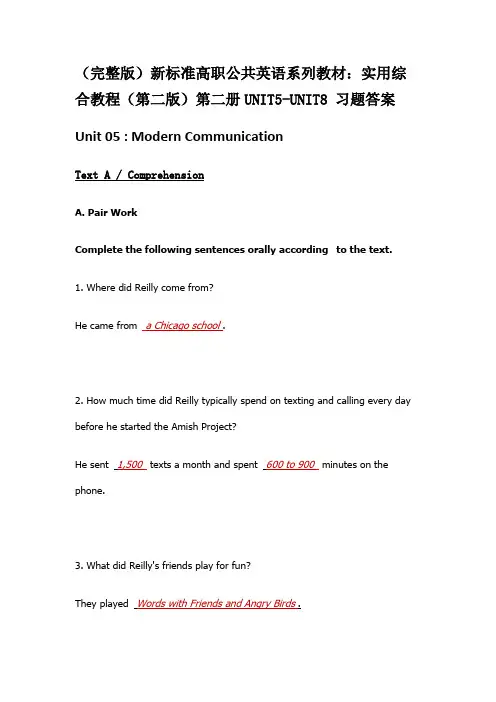
(完整版)新标准高职公共英语系列教材:实用综合教程(第二版)第二册UNIT5-UNIT8 习题答案Unit 05 : Modern CommunicationText A / ComprehensionA. Pair WorkComplete the following sentences orally according to the text.1. Where did Reilly come from?He came from a Chicago school .2. How much time did Reilly typically spend on texting and calling every day before he started the Amish Project?He sent 1,500 texts a month and spent 600 to 900 minutes on the phone.3. What did Reilly's friends play for fun?They played Words with Friends and Angry Birds.4. What drives Reilly crazy?That nobody is really doing anything, just sitting quiet and indulging in their cell phones drives him crazy.B. Main IdeaRead the text again. As you read, underline what you think are the most important ideas. Then, in one or two sentences, write the main idea of the text.It tells us what Reilly learned from living without electronic conveniences and how it changed his life.Vocabulary Building / ExercisesA. Match each word with their proper Chinese meaning.B. Fill in each of the following blanks with the proper form of the given words.1. Alex was almost speechless (speech) with anger and despair.2. I'm 25, have a nice flat, a good job and I'm not unattractive(attractive).3. Imposing speed restrictions(restrict) is easy, but forcing motorists to observe them difficult.4. I used to be a furniture dealer(deal).5. She would have loved to have a better-paying job with more responsibility (responsible).6. I knew I'd never find a parking(park) space in the Square.7. She received recognition(recognize) for her many achievements.8. She made frequent reference (refer) to a possible promotion during the talk.Grammar Tips / ExercisesA. Complete the following sentences based on the information given in Chinese.1. It is important to remember the time and the location of the meeting(记住会议的时间和地点).2. She wished to find the book she needed(找到她需要的书).3. I am glad to tell him the news (告诉他这一消息).4. My mother asked me to call her at the weekend(周末给她打电话).5. They left home early in the morning to catch the first train (以便赶上第一班火车).B. Each of the following sentences contains ONE mistake. Find it out and correct it.6. I got up earlier than usual in order to catching the first train.A B C D(D, catch)7. My biggest wish now is make friends with as many people as possible.A B C D (B, to make)8. It is high time that we encouraged our students working harder.A B C D(C, to work)9. Late at midnight, I heard someone to knock at the door twice.A B C D(D, knock)10. Finish the task within three days is next to impossible for such a youngman.A B C D (A, Finishing)Text B / ComprehensionA. Answer the following questions according to the text.1. How many emails do corporate users receive a day, according to a recent report in Business Week?According to a recent report in Business Week, corporate email users receive an average of 20 to 30 emails a day .2. What is spam?Spam is unwanted promotional email .3. Why can incoming email become a big problem if not managed properly? As users become distracted by these messages, they are more likely to lose track of other, more important messages and fall further behind in their work .4. What does Brightmail sell?Brightmail sells server-based software .5. Why can't email users depend fully on automated filters? Automated filters will never catch all of the spam, since spammers will continue to work hard in order to get their messages through. Apart from spam, useful emails will continue to increase in volume, as email becomes an increasing important method of communicating for business and personal purposes .B. Judge whether each of the following statements is true or false according to the text. Write T if it is true, or F if false.1. Email overload affects everyone today.2. Email users often spend time putting out fires.3. Software does not help email users very much.4. Automated filters can catch all kinds of spam.5. Software will provide the best solution to email overload in the end. Key: 1. F 2. F 3. F 4. F 5. FComprehensive ExercisesA. Choose the best answer.1. He sold his farm and ______ he had enough money for his journey.A. howeverB. thusC. yetD. also2. The next day when I went to meet John, I almost failed to _____ him in his Australian bush hat.A. recognizeB. discoverC. detectD. distract3. I would like you to feel that I am talking directly to you as you read ____ the book.A. outB. upC. throughD. in4. She is ______ behind with her school work because of her illness.A. stayingB. searchingC. graspingD. falling5. He was considered ______ of a hero in the town.A. somethingB. somewhatC. sometimeD. some6. We are justified in ______ equal rights at work.A. needingB. requiringC. demandingD. wanting7. The army defended the town ______ the enemy attack.A. againstB. toC. withD. over8. I want ______ pencils, please!A. two of dozenB. two dozenC. two dozensD. two dozens ofB. Fill in the blanks with the words given below.Twenty years ago, kids in school had never even heard of the Internet. Now, I'll bet you can't find a (1) single person in your school who hasn't at least heard of it. In fact, many of us use it on a (2)regular basis and even have access to it from our homes!The Internet is a vast resource for all types of (3) information. You may enjoy using it to do research for a school project, downloading your(4) favorite songs or communicating with friends and family. However, when you email people, you have to be very careful. If you've never met the person that you're communicating with (5) online, you could be on dangerous ground! You should never give away any(6) personal information to someone you don't know, not even your name! And just like you can't believe the information on every (7) website out there, you can't always trust the strangers you “meet” on the Internet, either. Just like you could make up things about yourself when chatting with someone online, he or she could do the (8) same to you!C. Translate the following sentences into English using the words or phrases you have learned in this unit.1. 手机的发明为我们提供了各种方便。
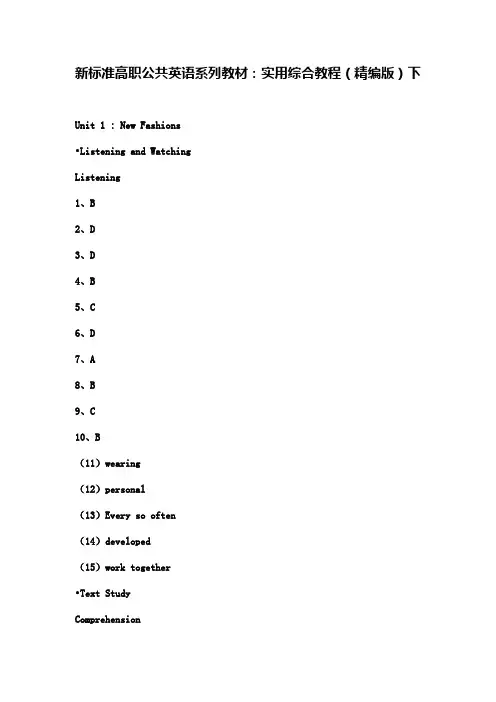
新标准高职公共英语系列教材:实用综合教程(精编版)下Unit 1 : New Fashions•Listening and WatchingListening1、B2、D3、D4、B5、C6、D7、A8、B9、C10、B(11)wearing(12)personal(13)Every so often(14)developed(15)work together•Text StudyComprehensionA:1. since the days of Picasso2. a well-known blogger3. the headshot, social-media sites4. modify the photos5. an important professional skillB:1. Headshot2. Lighting is important. Smile at the camera.3. To appear slender4. Cock your hip and let the other shoulder go forward. Cross the legs at the ankle. Wear heels.5. Rule for taking photos of shoes6. Aim the camera straight down. Modify the photo.•Vocabulary BuildingWord Test略Active WordsA:1. acts as a policeman2. hold a discussion on Internet3. depend on others to help us achieve success4. leaves his keys at home5. be lacking in courageB:1. hold on2. left out3. act on4. leave, behind5. be lacking in6. held on to7. leave alone8. catch hold of•Practical WritingExerciseReference:September 10 Dear M. Smith,I'm very sorry to tell you that I won't be able to make our appointment this Friday afternoon.This morning,my manager asked me to go to Beijing on business .I won’t be able to return until next Monday Could we meet next Wednesday afternoon? Please forgive me for any inconvenience I may have caused you.Sincerely yours,(Signature) Unit QuizI Directions:1-5: ABDAA6-10: CBABA11-15: CCDDCII Directions:1. d2. h3. g4. b5. j6. i7. e8. a9. f10. cIII Directions:1. 智能手机的内置高品质相机正在使自拍照变成年轻人表达自我的很好的方式。
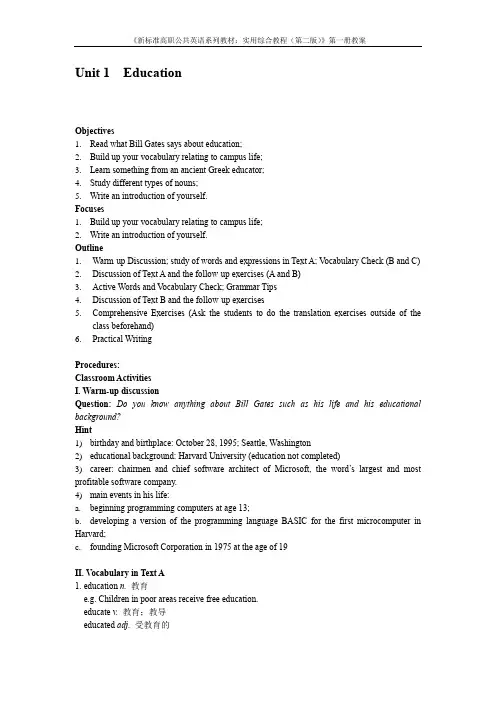
Unit 1 EducationObjectives1.Read what Bill Gates says about education;2.Build up your vocabulary relating to campus life;3.Learn something from an ancient Greek educator;4.Study different types of nouns;5.Write an introduction of yourself.Focuses1.Build up your vocabulary relating to campus life;2.Write an introduction of yourself.Outline1.Warm-up Discussion; study of words and expressions in Text A; Vocabulary Check (B and C)2.Discussion of Text A and the follow-up exercises (A and B)3.Active Words and V ocabulary Check; Grammar Tips4.Discussion of Text B and the follow-up exercisesprehensive Exercises (Ask the students to do the translation exercises outside of theclass beforehand)6.Practical WritingProcedures:Classroom ActivitiesI. Warm-up discussionQuestion: Do you know anything about Bill Gates such as his life and his educational background?Hint1)birthday and birthplace: October 28, 1995; Seattle, Washington2)educational background: Harvard University (education not completed)3)career: chairmen and chief software architect of Microsoft, the word’s largest and most profitable software company.4)main events in his life:a.beginning programming computers at age 13;b.developing a version of the programming language BASIC for the first microcomputer in Harvard;c.founding Microsoft Corporation in 1975 at the age of 19II. Vocabulary in Text A1. education n.教育e.g. Children in poor areas receive free education.educate v.教育;教导educated adj.受教育的e.g. a well-educated maneducator n.教育家,教育者2. count v.派用场,点数e.g. 1) Every seconds counts.2) What counts more is whether you have tried your best.3) to count from 1 to 1004) Count these apples.3. advantage n.有利条件,好处;优点,优势e.g. This product has many advantages.advantageous adj.有利的,有益的,便利的e.g. It is highly advantageous to us.Phrase: take advantage of 很好的使用;利用e.g. take advantage of all educational opportunitiesAntonym: disadvantage n.不利;不利条件e.g. His bad health is a great disadvantage to him when he looks for work.4. lifetime n.一生,终生e.g. 1) a lifetime guarantee2)lifetime membership3) In my father’s lifetime there have been many changes in the village.5. part-time adj.& adv.兼职的(地)e.g. 1)a part-time job2)He works part-time.full-time adj.全职的e.g. a full-time housewife6. programmer n.程序师,编程员program v.编制程序e.g. Please program the computer to do the job instead of doing it manually(手工操作).7. discourage vt. 不鼓励;使泄气,使失去信心e.g. His parents discouraged him from joining the air force.discouraged adj. 泄气的,失去信心的discouraging adj.使人泄气的,使人失去信心的e.g. 1) If you meet difficulty in your study, don’t be discouraged.2) It is discouraging that I didn’t know how to solve the problem.Antonym: encourage vt.鼓励e.g. I encouraged her to work hard and to try to pass the examinations.courage n. 勇敢,勇气e.g. David showed great courage when he saved the child from the burning house.8. diploma n. 文凭,毕业证书e.g. a college diplomadiplomatic adj. 外交的,从事外交的e.g. Julia joined the diplomatic service after her graduation from university.9. project n.项目,课题e.g. 1) an impossible project2) The professor is directing a research project.Synonym: plan10. highly adv. 高度地;非常e.g. 1) a highly interesting story2) a highly paid jobPhrase: speak/ think highly of 赞扬,对…给予很高评价e.g. The leader speaks / thinks highly of our work.11. focus v.(使)集中;(使)聚焦e.g. 1) to focus (one’s mind) in work2) All eyes focused on the speaker.focus n.(兴趣活动等的)中心,焦点e.g. Because of his strange clothes, he immediately became the focus of attention when heentered the office.12. range n. 范围e.g. You have a wide range of choices.range vi.在某范围内变化e.g. The temperature ranges from 10 to 20 degrees.13. attend v.参加,出席e.g. attend schoolattend a lectureattendance n.出席,到场14. automatically adv.自动地e.g. the machine operates automatically.automatic adj.自动的e.g. We have an automatic washing machine.15. drop out of 退学,不参与,退出e.g. 1) He dropped out of school at the age of 10 because his family was too poor to afford thetuition.2) She decided to drop out of the competition because it was not fire.16. chance of a lifetime 千载难逢的良机,一生中唯一的机会e.g. It’s the chance of a lifetime. You will regret it the rest of your life if you don’t take it.17. try out 试验,考验e.g. She bought a cookbook and tried out a few new recipes.18. in short 简而言之,总之e.g. In short, you should study hard for a better future.Synonym: in brief/ to sum up/ all in all/ in conclusionIII. Language Points in Text A1.They want to know what to study, or whether it’s Ok to drop out of college since that’s what I did.what to study: This is a wh-word + infinitive structure used as the object, which can be changed into an object clause. Wh-word + infinitive structure can be used as a subject, an object, or an appositive clause(同位语从句),for example:1)How to improve their English is often discussed among the students.2)We haven’t decided when to visit the place.3)You haven’t answered my question about where to get these books.it’s Ok to drop out of college: Here “it” is used as a formal subject, and the actual subject is the infinitive structure “to drop out of college”. The general pattern is “It is + adj. + (for/ of + sb.) to do sth.” More examples:1)It was very thoughtful of her to come to see me when I was ill.2)It’s easy for me to see through his trick.that’s what I did: “what I did” here is a predictive clause (表语从句)introduced by “what”. It is always structured in the form of “subject + be/ look/ remain/ seem + predictive clause” and can be introduced by such words as “that” (always omitted), and other wh-words, for example:1) It seems (that) it is going to rain.2) This is why I refused to attend the meeting.2. As I’ve said before, nobody should drop out of college unless they believe they face the chance of a lifetime.As I’ve said before: This is a non-restrictive relative clause(非限制性关系从句) introduced by “as”(正如…的那样), which can be placed at the beginning or at the end of the sentence. More examples:1) As people expected, she was admitted to Beijing University.2) Hundreds of people were killed in the earthquake, as I have learned from the newspaper. unless: is a conjunction for an adverbial clause of condition (条件状语从句), which equals “if…not…”(除非).e.g. I won’t leave unless the rain stops.3. In my company’s early years, we have a bright part-time programmer who planned to drop out of high school to work.planned to: intend to do sth.计划、打算做某事e.g. I plan to make a trip to Beijing during the summer vocation.who planned to …work: a restrictive relative clause introduced by “who” since its antecedent is a person and serves as the subject in the clause. The relative pronoun “that” can be used here too. More examples:1) The young man who sits there quietly is my brother.2) I don’t like people that pry into others’ private business.4. Having a diploma certainly helps somebody who is looking to us for a job.look to sb./ sth.: to depend on sb. or sth. for help or advice 指望,依赖e.g. We look to you for support.5. High school and college offer you the best chance to learn many things and to do projects with others that teach you about team spirit.that teach you about team spirit: This is a restrictive relative clause introduced by “that”, whose antecedent acts as the subject of the clause. Actually the relative clause introduced by “that” can be used to modify both the person or the thing, and the roll of “that” can be either the subject or the object.e.g. He was the only one that I knew there.I haven’t been to the place that you have mentioned.6. In high school there was a time when I was highly focused on writing software, but for most of my high school years I had many interests.when …software: This is a relative clause introduced by the relative adverb “when”, which actsas the adverbial of time in the clause.e.g. 1) There was a time when I completely lost my self-confidence.2) I will never forget those days when we were together.7. For me, classroom is not the only place where you can learn.where you can learn: This is a restrictive relative clause introduced by the relative adverb “where”, which is used as the adverbial of place in the clause.e.g. 1) Do you still remember the restaurant where we had dinner last night?2) This is the place where he stayed his whole life.8. In short, it’s a real mistake not to take the chance to study a wide range of subjects and to learn to work with other people because education does count.it’s a real mistake not to take the chance: This is an example of a negative infinitive structure, where “not” is placed before an infinitive.e.g. 1) We are asked not to speak loudly in class.2) It is a good idea not to go out on such a rainy day.IV. Focus on Grammar名词(Noun )一、名词的概念表示人、事物或抽象概念的词叫做名词。
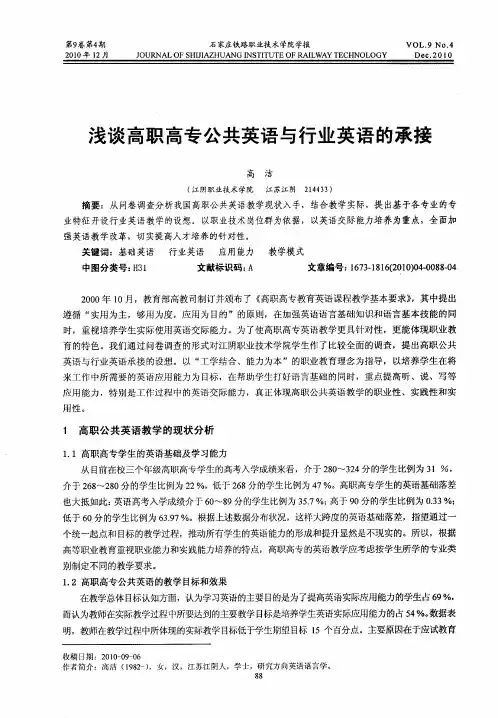
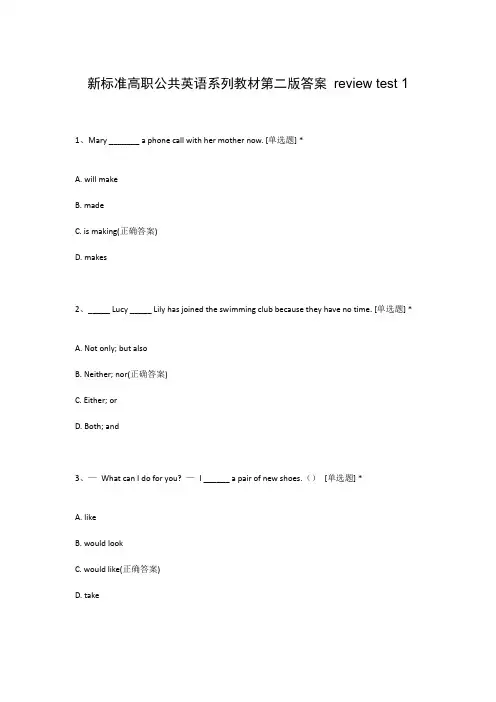
新标准高职公共英语系列教材第二版答案review test 11、Mary _______ a phone call with her mother now. [单选题] *A. will makeB. madeC. is making(正确答案)D. makes2、_____ Lucy _____ Lily has joined the swimming club because they have no time. [单选题] *A. Not only; but alsoB. Neither; nor(正确答案)C. Either; orD. Both; and3、—What can I do for you? —I ______ a pair of new shoes.()[单选题] *A. likeB. would lookC. would like(正确答案)D. take4、Jim is a(n) _______. He is very careful and likes to work with numbers. [单选题] *A. secretaryB. tour guideC. accountant(正确答案)D. English teacher5、My brother will come to see me tomorrow. I’ll meet?_______ at the airport. [单选题] *A. herB. youC. him(正确答案)D. them6、—Why do you look so ______?—Our team won the basketball match!()[单选题] *A. angryB. excited(正确答案)C. nervousD. unfair7、I’ve _______ a job interview today. [单选题] *A. haveB. had(正确答案)C. hasD. have gone to8、72.—? ? ? ? ? ? ? ? ? ? ? ??—Yes, please. I want a sweater. [单选题] * A.How muchB.Can I help you(正确答案)C.Excuse meD.What will you take9、I run out of money. Could you _______ me some?[单选题] *A. lend(正确答案)B. sellC. borrowD. buy10、Mrs. Green has given us some _______ on how to study English well. [单选题] *A. practiceB. newsC. messagesD. suggestions(正确答案)11、—_____ will the bus arrive? —In four minutes. [单选题] *A. How longB. How oftenC. How soon(正确答案)D. How far12、My home is about _______ away from the school. [单选题] *A. three hundred metreB. three hundreds metresC. three hundred metres(正确答案)D. three hundreds metre13、My brother is too shy. He _______ speaks in front of lots of people. [单选题] *A. alwaysB. usuallyC. seldom(正确答案)D. sometimes14、I think ______ time with my friends is fun for me.()[单选题] *A. spendB. spendC. spending(正确答案)D. spent15、—______is my notebook?—Look! It’s in your schoolbag.()[单选题] *A. WhatB. WhichC. Where(正确答案)D. How16、During the Spring Festival, people in Northern China usually eat _______ as a traditional Chinese food. [单选题] *A. pizzaB. dumplings(正确答案)C. hamburgersD. noodles17、When you have trouble, you can _______ the police. They will help you. [单选题] *A. turn offB. turn to(正确答案)C. turn onD. turn over18、I don’t like playing chess. It is _______. [单选题] *A. interestingB. interestedC. boring(正确答案)D. bored19、We had a(an)_____with him about this problem last night. [单选题] *A.explanationB.impressionC.exhibitionD.discussion(正确答案)20、You wouldn't have seen her if it _____ not been for him . [单选题] *A. hasB. had(正确答案)C. haveD.is having21、I have a _____ every day to keep fit. [单选题] *A. three thousand meter walkB. three-thousands-meters walkC.three-thousand-meters walkD. three-thousand-meter walk(正确答案)22、18.Who is staying at home now? ________, all of them are out. [单选题] *A.NoneB.No one(正确答案)C.EveryoneD.Nothing23、41.—________ do you take?—Small, please. [单选题] *A.What size(正确答案)B.What colourC.How manyD.How much24、You can't rely on Jane as she is _____ changing her mind and you will never know what she is going to do next. [单选题] *A. occasionallyB. rarelyC. scarcelyD. constantly(正确答案)25、It’s usually windy in spring, ______ you can see lots of people flying kites.()[单选题] *A. so(正确答案)B. orC. butD. for26、You have been sitting on my hat and now it is badly out of(). [单选题] *A. dateB. shape(正确答案)C. orderD. balance27、The family will have _______ good time in Shanghai Disneyland. [单选题] *A. theB. a(正确答案)C. anD. /28、This year our school is _____ than it was last year. [单选题] *A. much more beautiful(正确答案)B. much beautifulC. the most beautifulD. beautiful29、—John, How is it going? —______.()[单选题] *A. It’s sunnyB. Thank youC. Well doneD. Not bad(正确答案)30、18.Monica wants to be a _______. She is good at sports and she loves teaching others. [单选题] *A.coach(正确答案)B.secretaryC.architectD.waiter。
⾼职⾼专新职业英语(课程标准)《新职业英语·职业综合英语》课程标准课程代码:课程名称:新职业英语·职业综合英语英⽂名称: English for Careers课程类型: 必修课、公共基础课总学时: 48 讲课学时: 36 实验学时:12学分: 3.5适⽤对象: ⾮英语专业⼤学⼀年级学⽣⼀、课程定位该课程为⾼职⾼专公共基础课,也是⾮英语专业的必修课。
教学⽬的是使学⽣掌握⼀定的英语基础知识和技能,具有⼀定的听、说、读、写、译的能⼒,从⽽能借助词典阅读和翻译有关英语业务资料,在涉外交际的⽇常商务活动中进⾏简单的⼝语及书⾯交流,并为今后进⼀步提⾼英语职场交际能⼒打下基础。
⼆、主要任务根据国家教育部⾼等教育司颁发的《⾼职⾼专教育英语课程教学基本要求》(以下简称《基本要求》)。
1.词汇认知3400个英语单词(包括⼊学时要求掌握的1600个词)以及由这些词构成的常⽤词组,对其中2000个左右的单词能正确拼写,英汉互译。
学⽣还应结合专业英语学习,认知400个专业英语词汇。
2.语法掌握基本的英语语法规则,在听、说、读、写、译中能正确运⽤所学语法知识。
3.阅读能⼒能阅读中等难度的⼀般题材的简短英⽂资料,理解正确。
在阅读⽣词不超过总词数3%的英⽂资料时,阅读速度不低于每分钟70词。
能读懂通⽤的简短实⽤⽂字材料,如信函、技术说明书、合同等,理解正确。
4.写的能⼒能就⼀般性题材,在30分钟内写出80-100词的命题作⽂;能填写和模拟套写简短的英语应⽤⽂,如填写表格与单证,套写简历、通知、信函等,词句基本正确,⽆重⼤语法错误,格式恰当,表达清楚。
5.翻译能借助词典将中等难度的⼀般题材的⽂字材料和对外交往中的⼀般业务⽂字材料译成汉语。
理解正确,译⽂达意,格式恰当。
在翻译⽣词不超过总词数5%的实⽤⽂字材料时,笔译速度每⼩时250个英语词。
三、课程⽬标本课程的教学⽬标为:通过学习使学⽣掌握⼀定的英语基础知识和技能,具有⼀定的听、说、读、写、译的能⼒。